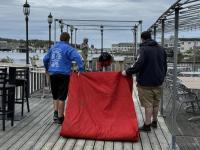CTL founder retires
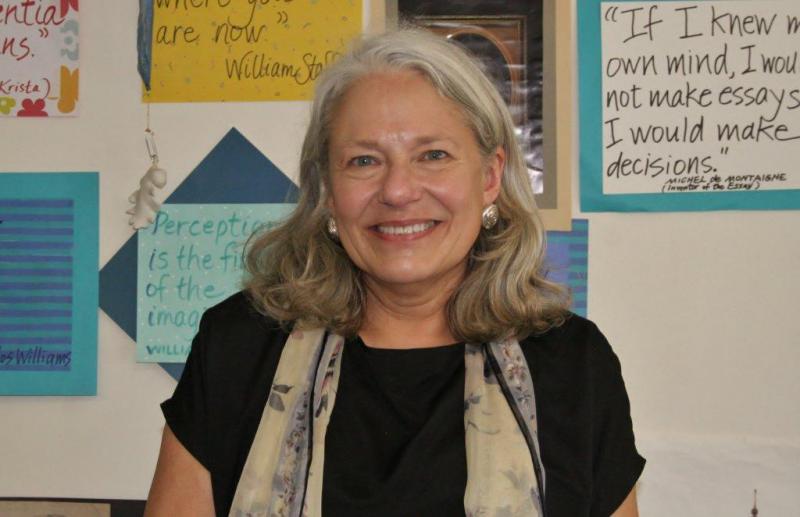 Nancie Atwell in her shared seventh and eighth grade classroom at her beloved Center for Teaching and Learning in Edgecomb. LISA KRISTOFF/Boothbay Register
Nancie Atwell in her shared seventh and eighth grade classroom at her beloved Center for Teaching and Learning in Edgecomb. LISA KRISTOFF/Boothbay Register
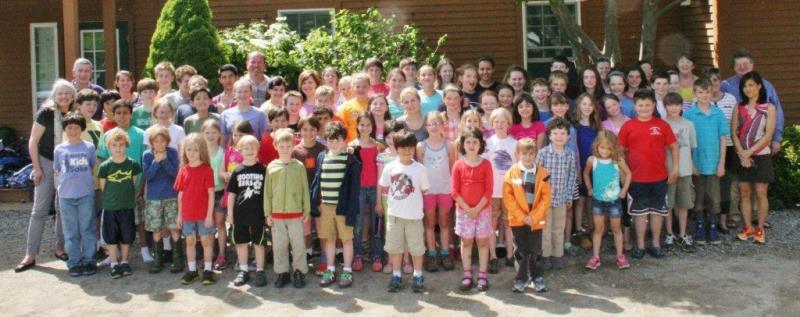 The 2012-2013 student body and teachers of the Center for Teaching and Learning. The group photo imitates the first photo taken in 1990 when the school first opened. Founder, teacher and chairman of the board Nancie Atwell, on left, second row, is retiring at the end of this school year. LISA KRISTOFF/Boothbay Register
The 2012-2013 student body and teachers of the Center for Teaching and Learning. The group photo imitates the first photo taken in 1990 when the school first opened. Founder, teacher and chairman of the board Nancie Atwell, on left, second row, is retiring at the end of this school year. LISA KRISTOFF/Boothbay Register
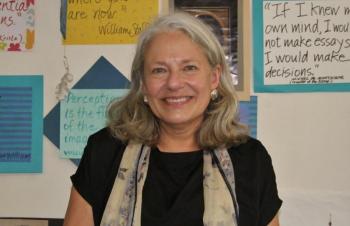 Nancie Atwell in her shared seventh and eighth grade classroom at her beloved Center for Teaching and Learning in Edgecomb. LISA KRISTOFF/Boothbay Register
Nancie Atwell in her shared seventh and eighth grade classroom at her beloved Center for Teaching and Learning in Edgecomb. LISA KRISTOFF/Boothbay Register
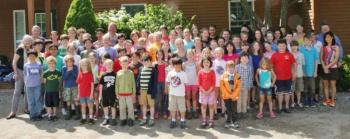 The 2012-2013 student body and teachers of the Center for Teaching and Learning. The group photo imitates the first photo taken in 1990 when the school first opened. Founder, teacher and chairman of the board Nancie Atwell, on left, second row, is retiring at the end of this school year. LISA KRISTOFF/Boothbay Register
The 2012-2013 student body and teachers of the Center for Teaching and Learning. The group photo imitates the first photo taken in 1990 when the school first opened. Founder, teacher and chairman of the board Nancie Atwell, on left, second row, is retiring at the end of this school year. LISA KRISTOFF/Boothbay Register
The light in Nancie Atwell's eyes reflects her passion for teaching.
Her body of published works on the reading/writing workshop method of teaching are physical representations of her commitment to educating children, and to fellow educators.
Atwell founded the Center for Teaching and Learning (CTL) in Edgecomb for grades K-8 in 1990. This month, at the end of the school year, Atwell will retire from a career that has spanned 40 years.
CTL is certified by the New England Association of Schools and Colleges and is a 501(c)(3) non-profit school and is the learning base for a maximum of 80 students in a school year.
From the outset, Atwell was committed to making the school affordable for children of all socioeconomic backgrounds and abilities. Tuition is currently $8,600 per year.
Atwell, the educator, author of books and articles, and conductor of reading/writing workshops nationwide, said she has had a very happy career doing work she loves that has been “incredibly stimulating, rewarding and satisfying.”
Of all her many accomplishments, it is the time spent in the classroom that has been the most rewarding. Atwell began teaching in Tonawanda, N.Y, in 1973. While at the Tonawanda Midde School, she designed, implemented and disseminated a junior high writing curriculum.
In 1975 she began teaching in the Boothbay schools where she designed and implemented a research-based writing and reading curricula, again for middle school students.
It was during these early teaching years that Atwell began researching teaching methods. This research led her to the discovery of the work of Donald Graves, from University of New Hampshire, who has been credited with pioneering the writing workshop method.
Aspects of the method include: students choose their own books and writing topics; they work at their own pace; research; meet with their peers and teachers on a regular basis to talk about what they are reading and writing; and enjoy one-on-one instruction/guidance by teachers who are also readers and writers.
“It set my hair on fire,” Atwell said about her first discovery of the method. What would her role be if the students were making decisions about their learning experience?
“But eventually I realized my authority wasn't in my assignments, but in my expertise as a writer and reader,” she said.
Reading is important for everyone, particularly for writers. Atwell said writers need time to think, write, choose their topics, and use their books of choice to help them shape their own ideas and concerns. “Otherwise, it is just an exercise,” she said. “Writing is the highest form of thinking.”
Every room in CTL has a library to feed and stretch a student's mind. On average, CTL students read 50 to 60 books a year and do book talks that are like commercial spots for books in which they rate books, Atwell said. They also write book reviews.
“They leave here intensely literary, but not in a sort of precocious way,” Atwell said. “They recognize they love stories and characters – and, really, that's the heart of reading.
“I believe the range of books they have read and the ideas and experiences they've thought about has contributed to that.”
Atwell can still vividly recall when her own passion for reading and writing was kindled. In fifth grade, Atwell contracted rheumatic fever, which left her immobilized for six months. Because she was growing increasingly bored, her mother started bringing home library books for her to fill her time.
“That's when I started to love stories,” Atwell said. “I can still remember what the copy of 'The Secret Garden' felt like.
“It had an old, faded cloth cover. I can still remember what it smelled like. I read that book again and again.
“I'd never had that experience; to be living in a story and having a vicarious experience.”
In addition to providing award-winning teaching and a rigorous curriculum, Atwell always intended that CTL would be a demonstration school for educators.
At the end of the 1985-1986 school year in Boothbay, Atwell resigned from her teaching position to spend with her infant daughter, and husband, Toby McLeod. She had begun writing about her students at BRES and the work they were doing writing and reading.
During that year, she began doing consulting work for school districts that hired her to work with teachers on how to teach writing, and continues to do so.
Through a grant from the Bread Loaf School of English at Middlebury College from 1986 to 1989, she was the project director of a writing across the curriculum project for reading, writing and mathematics. Atwell worked with three Maine schools showing educators ways to use writing, science and history to help kids learn concepts.
But, she found she missed being in the classroom. Atwell contemplated how she could continue teaching teachers and be in the classroom. Combining the two was the genesis of the school as a demonstration school from the get go.
In the school's second year, practicing teachers began arriving in teams of five to spend one week in the Intern Program. Over the years, teachers have come to CTL from almost every state in the country. Teachers have also come from Canada, England, India, Uganda, the Philippines, and Ecuador. They are drawn by Atwell's writer/reader workshop method also employed in teaching mathematics. Practicing teachers will then return to their classrooms to adapt, adopt or model new teaching methods modeled on those at CTL. The tuition fees of intern teachers are used to fund the school's scholarship fund for tuition assistance.
Sales of her books and DVD sets of the “In the Middle” series will also be used for that purpose. And that, Atwell said, should be the goal of a demonstration school: to provide a stimulating, engaging, rigorous curriculum of all socioeconomic backgrounds.
“Certainly there has been a satisfying response to our idea for the school,” Atwell said. “Teachers from other schools may have more students per class (CTL averages 17), but they see our kids are just like theirs with the same issues as theirs.
“They see how the model can be successfully applied. It is a direct relationship: student to teacher; writer to writer; reader to reader.”
Atwell is gratified by the successful implementation of the reader/writer workshop method in the United States and abroad.
“All the talk right now about standards and rigor – we forget to ask the question, why would anyone want to write or read? I think it's because of the attraction of stories and self expression. If those aren't the two threads pulling your language arts program together, there is something wrong. If there isn't investment, there's never going to be the passion and the growth we see here,” Atwell said.
“The thing I love and live for is the classroom and my contact with students, especially seventh and eighth graders. I adore them. They are unpredictable, they are sincere, witty, and just on the cusp on figuring out what adulthood means, what it might offer them, and what a worthwhile life might be ….”
Today Atwell has had the children of many of former BRES students at CTL, and, this year, a grandchild of one.
Two years ago Atwell began contemplating retirement. Last summer she made her decision to end her career in June 2013.
At CTL teachers hire other teachers. This winter they found Atwell's successor: her daughter and CTL alumni, Anne Atwell-McLeod.
Atwell-McLeod has been teaching in Washington, D.C., and Maryland since her graduation from Amherst College in 2008.
Atwell has great confidence vested in her current teaching staff; through them, the theories, philosophy and methods of CTL teaching will continue on.
“Knowing they will be here making sure CTL continues has made the decision easier, but it is still bittersweet,” Atwell said.
Atwell will still be chairman of CTL's board of directors, and she will be finishing up the third revision of her “In the Middle” series. She is also working on a separate book/DVD project, called "Systems to Transform Your Classroom and School." And that, she says, will be the end of the writing.
Her focus is this next phase in her life, one in which she will select books to read from the stack on her bedside table; tend the flowers in her gardens and travel with her husband.
Event Date
Address
United States




















